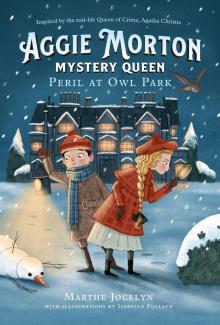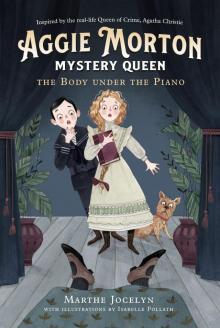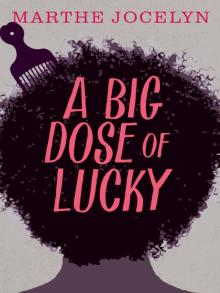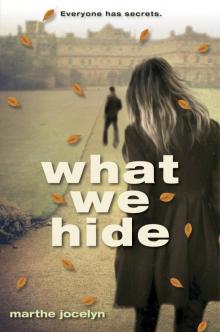- Home
- Marthe Jocelyn
A Big Dose of Lucky Page 2
A Big Dose of Lucky Read online
Page 2
It’s the sound that unnerves me, a hollow roar as if someone very sick were trying to breathe in long, shuddering tremors. Then the windows start to pop, so loudly it’s like pistol shots. Toni shrieks and grabs her head with her hands. For a second we all think she has somehow been hurt. But the next second she’s running across the field, making a dreadful howl.
Betty says, “Just let her go.”
There goes the library. A deafening crackle as the hungry fire eats up thousands of pages, taking all the words in a greedy feast of paper. Our rooms, at the top, fall in an avalanche of glowing timbers. The sinks from the blue-door bathroom are spat into mid-air like gumballs. The kitchen is crushed, the dining hall, all those shelves of chunky china. Does china burn? Or turn to ash? A million shards of a million mealtimes are crushed under the bones of the house.
Someone is tugging on my arm.
“Malou, come on. Malou!” Dot’s face is smudged black. Can I be even blacker? I blink my stinging eyes and look around. All the girls are singed and weary. Cady and Miss Webster carry a sobbing Kathy toward the Home’s van. We’re supposed to go too, Dot’s telling me. They’re waiting.
Three or four more cars have come from town. Men and women race over the grass, rounding up wandering children, hustling them toward blankets and cars.
Finally the hee-haw of a siren rips up the drive as the firemen arrive, pushing my heart into my throat and slamming my ears. Big men with black coats and enormous boots stomp across the grass. One guy waves a stick that’s been painted with something that makes it glow in the dark.
“Move back, move back!”
The blackened frame of the house is silhouetted against roaring flames, a skeleton in dancing light.
I REMEMBER A PICTURE
On the television in Joe’s room last fall, I saw a news story about a burned-up church in Alabama. Four little Negro girls died when a bomb went off at their Sunday school. The bomber was someone who hated Negroes. The segregation of whites and coloreds in the United States was maybe coming to an end. The bomb was a protest against having Negroes mingle up close with white-skinned people.
We are not encouraged, in the Home, to be curious about the news. We’re meant to be safe here, like boats in a harbor, not concerned with the waves that rock the sea. But Joe, he’s got a little television in his room. And Joe, he’s from New Orleans, where he says every second person is brown like me. He says there’ll be a day when I’ll have some of those people in my own life. He says that being a Negro is not about not being white. It’s about being who I am, even if that doesn’t make sense yet. He says I need to know that. Joe used to be a musician before he came to Canada. He played the guitar in bars all over the southern United States. He says he has lots of friends who are dark-skinned like me. He even had a sweetheart, he says, as dark as plum pudding. Her name was Asha. So when news happens about Negroes, he invites me to come and watch. Especially stuff about fighting for what’s fair. At the Home, I never have to fight. The girls and teachers know me here, so there’s no bother. In the town though—like with Luke and those other boys today—I get stared at with suspicious, slitty eyes. Not orphan staring. Negro-orphan staring. Is it something more than just rude?
Does somebody hate me as much as the bomber hated those four little girls in Alabama?
Is this fire somehow because of me, the darkie?
THE VAN
Joe climbs into the driver’s seat while we load in every Little we can get our hands on. Marjorie is clinging around Miss Webster’s neck like a boa constrictor, practically choking her. It takes a few minutes to peel her off.
“I hear singing,” says Cady.
So do I. It’s faint, because the fire is still roaring, but we recognize Mrs. Hazelton’s voice, trembling a little, offering up “Amazing Grace” the way she does sometimes at assemblies.
“Get in!” says Miss Webster. Her eyes are pink-rimmed, her hair sticking out in all directions. Her room is gone too.
One more glance at the burning Home, and we squish in with the other girls. The smell in the van is like a fireplace when the logs are damp. When they smolder instead of burn.
TWO
THE CHURCH
By the time we stumble out of the van and into the basement hall of St. Jerome’s church, lipsticked ladies are lined up to take the Littles into their homes, two or three at a time. The minister’s wife wraps shawls around Kathy and Lindy and gently guides them away to the rectory. Tess has shown up, fully dressed in her regular clothes, not her nightie. Toni’s still who knows where. But we’re considered too old to be taken into anyone’s home. What if somebody’s son got it into his head to get flirty with an orphan? We’re told to wait in a pew. Plenty of Bibles to go around.
We’re getting looks from the ladies, and I see us through their eyes, all wearing grimy variations of the same summer nightie. Our April assignment in Home Economics. We had to choose between yellow-striped seersucker and a nubbly white muslin that was probably meant for curtains. We all chose the seersucker. Now we’re like a band of castaways, sooty and bedraggled, baring our legs in the house of God.
The boss church lady must have dressed quickly. We nudge each other, needing something to laugh about. She’s got this stiff skirt and buttoned-up silky sweater, but underneath she’s wearing a nightgown!
“Hello, my dears.” Voice all sugar. We pretend there aren’t bunnies frolicking around her calves. “My name is Mrs. Damper.” Her hair is combed smoothly at the front but quite the nest in back.
Tess slowly crosses her eyes. Cady and I cough and giggle while Betty shakes her head at us, like, Don’t be so rude!
“Girls?” Not so pleasant this time. “I’ll thank you to pay attention to the goodness you are being offered.”
Two other ladies sit in a pew nearby, guarding a mound of clothing that turns out to be the goodness being offered. Families in town have hastily gathered their reject clothes to give to us, since our stuff is gone. Up in smoke. Isn’t that the saying? Now we know exactly what that means.
“Dibs on that purple fuzzy thing,” I say. “Whatever it is.” An uglier color has not yet been invented.
“I’ll take the salmon golf shorts,” says Dot. “Size triple X.”
That sets us off laughing, each of us a smarty-pants with something to add about the thoughtful donations.
Mrs. Damper doesn’t like us sounding ungrateful. “You will make your selections in an orderly fashion,” she says.
“Fashion?” murmurs Sara. She’s the one who cares most about clothes. Give her twenty minutes and she could turn a towel into a party dress. Even her Home smock has embroidery on it. Not like the rest of us—dull, dull, dull.
We move in and start to poke through the piles. I take a cotton skirt the color of dry grass and two shirts. One is striped, gray and pale green, the colors of spring branches. The other shirt is navy blue with white buttons. And I pick up a cardigan sweater that no one else wants because it must have belonged to a fat man, but I like the pockets that close with zippers. I also scoop a ragged pair of pajamas, made of soft, blue-checked flannel. I won’t let myself think who might have been wearing them for the past few hundred nights. Lucky thing I put on my sneakers back in the dorm. Shoes are going to be a problem for the others. No one finds anything that actually fits. As if any of us want lilac-colored high heels.
And now what? Are we supposed to change in front of Jesus?
“What about underwear?” I say. Heads all around shake; no, there doesn’t seem to be any. “Not that I want Mrs. Damper’s cast-off panties,” I say, “but…”
I edge closer to Mrs. Pitt. She’s married to the pharmacist who was kind yesterday after those boys did what they did. She smiles at me, not entirely real but not nasty either. Not like Mrs. Damper across the room, whose eyes flutter over me like I’m a snail in her salad.
I remember a white woman’s face on Joe’s television last summer, her mouth twisted in rage. She was standing on a beach somew
here in Florida, backed up by a dozen other angry white people. The news camera was there because some Negroes were walking across the sand toward the water that tumbled over itself. It was an ocean, not a lake. Salty, Joe said. The black people were protesters, he explained, claiming they had the right to put their dark feet in the same waves where the white people paddled.
But the white people didn’t like it one bit. While the camera watched, the crazy-mad white woman spat, straight into a black woman’s face. I never saw hate like that before. Joe turned off the television when he saw me tearing up. “That’s the real world, Miss Malou,” he said. “Better you know that.”
I blink to push away the memory. Mrs. Pitt is waiting to know why I’m standing next to her.
“Excuse me.” I touch her sleeve and stand on my tiptoes. I whisper. “We need underthings.”
GUTHRIE’S BRIDAL AND DELICATES
Mrs. Guthrie goes to rob her own shop. On a Sunday! Giddy and flushed at her daring, she has run along Main Street with a bag holding fifty pairs of underpants and a tangled mess of bras. She bursts into the church hall and can’t stop grinning as she goes from girl to girl, making certain we receive two each in the right size.
STONE SOUP
There’s this book I read to the Littles sometimes, called Stone Soup, by Marcia Brown, based on an old folktale. It’s not about orphans; it’s about stingy people who get tricked by hungry soldiers passing through the village. The soldiers boil a pot of water and put three stones in the bottom, claiming their soup will be ready soon. One villager offers some carrots to improve the flavor, and someone else brings herbs. Potatoes come out of someone’s cellar, and then other vegetables and even meat. Finally, there is a truly delicious meal, made by cooperating families and enjoyed by all.
It’s like that story comes to life when Mrs. Guthrie opens her bags and starts handing out underpants. The dentist’s wife looks as if she has swallowed a toad and goes rushing out. She comes back a few minutes later with a whole carton of toothbrushes from her husband’s office, along with dozens of teeny cute tubes of toothpaste.
It turns into a contest. The church ladies are instantly vying to make the most impressive donation to the needy orphans. We get bologna sandwiches, cups of noodle soup, sugar cookies, new socks from Woolworth’s and Popeye the Sailorman kazoos from a peculiar woman whose brother owns the gas station and had a whole box of these prizes in his cellar. Just what we need to recover from having our house burn down.
I’M ITCHY LIKE I’VE GOT A RASH
It’s as if the clothes from the charity box are lined with sand, the way I can’t get comfortable wearing them.
New clothes, new world. Whether we like it or not.
Among the piles I find this double-thick shiny shopping bag with the name of a store embossed on the outside. Simpson’s. The bag is stiff and strong and has handles made of silky cord. It’s almost as good as a cardboard box, except that it doesn’t close. It’s not exactly a handkerchief bundle on the end of a stick like you think of Huck Finn carrying, but it’s my version.
EVENTUALLY IT’S MORNING AGAIN
Most of us fall asleep for a while on the pews, but then the bells start ringing in the tower and wake us up. The morning service will be starting upstairs in a while, but I figure for once we don’t have to go.
THE STRANGEST DAY
Miss Webster shows up and finds us all still half-snoozing. She rouses us with little pokes, Mrs. Damper included, who has nodded off leaning against the vestry door.
Miss Webster says that Mrs. Hazelton wants to see the Seven, even if we’re only five right now. Toni never showed up at the church, and, looking around, we realize that Sara must have gone to work at Loretta’s Diner as if nothing at all had happened, as if our whole world hadn’t fried during the night.
Mrs. Damper seems relieved to be done with her duty as chief charitable officer, but also worried that some of us are missing.
Miss Webster sighs. “Malou, please check for Sara at the café. Mrs. Hazelton was emphatic about wanting to see each of you. And where is Toni? Has anyone seen Toni?”
The Benevolent Home is gone, she tells us, and we’re to be split up and sent our separate ways. So much for benevolence. We eye each other, sleepy, sooty, bewildered. How can this be real?
I DO MISS WEBSTER'S BIDDING
I come into Loretta’s Diner and stop dead, heart jammed in my throat. Sara’s boyfriend, Luke, is sitting on a stool, and he turns around with a smirk at the sound of the door.
I stay where I am, with the door partway open.
“Sara.” It comes out in a whisper.
Luke’s fingers tap a rhythm on the counter. Sara hasn’t heard me.
“Hey, Sara, looks like you’ve got a little friend come to visit,” he says to her. “A dark shadow.” He starts to laugh. “With a curse on her.”
Sara turns around. “Oh! Malou! Hi, what’s wrong?” She winces at her own dumb question. “I mean, you know, why are you—”
“There’s a meeting.” I keep the door propped open with my sneaker, ready to leave. “We all have to see Mrs. Hazelton. Today. Before three o’clock. No excuses. Not even your job.”
I don’t wait to see what she does. I’m outside and running before she even answers.
MY TURN
I’m waiting on the bench near the front door where Mrs. Hazelton likes to sit in the evenings, “to sip the air,” she says. No one has seen her cat, Barnaby, since yesterday. None of us want to say out loud that he’s probably dead. Otherwise the little cottage looks just the same. If you don’t look over your shoulder to where the smoking rubble looms.
Cady comes out with that look on her face like she wants to kick somebody.
I GO IN, SHE TALKS TO ME, I COME OUT
Fifteen minutes? Twenty? That’s all it takes to shake my world.
MRS. HAZELTON DOESN’T LOOK TOO WELL
She’s the closest thing to a mama I’ve got, even if she’s not exactly cuddly or fun. More like Marilla Cuthbert of Green Gables who takes in Anne, all sharp edges and tucked-in lips. But I was a teeny-tiny baby, she’s told me lots of times. I’m practically the littlest baby she ever held. Only Dot was smaller. She was a dot.
One time we found a bird beside the big maple near the shed. It had fallen from a nest way up. We could hear the mother shrieking when we scooped the tiny thing into a cereal bowl, its heart bumping so hard I could feel it through the breast fluff. That’s the smallest baby I ever held. It died the next day.
Mrs. H. did a better job with me.
“My dear,” says Mrs. Hazelton, with that English hum that makes her sound as if the person she’s addressing really is the dearest. I used to think it was me, the most special, but I hear her say it to other girls too.
Again: “My dear.” She pats her sticky-outy hair, not the usual neat-as-a-pin Mrs. Hazelton, and she must know it. We’re all a bit ragged.
“Forgive me if I sit,” she says. “This day…has quite taken the oomph out of me.”
She’s breathing funny between words. “I’ll be leaving shortly.” She closes her eyes and takes a deep, careful breath. “It’s the smoke…I need a rest. But first…there is business to attend to.”
WHAT SHE SAYS
“Malou,” she says. “Malou Gillis.”
I smile at her like I always do when she says my name. We both love Ruby Gillis in Anne of Green Gables. She’s the blond one who’s a bit boy-crazy—the exact opposite of me. She dies a romantic death of galloping consumption. Isn’t that the best name for a disease, even if it’s only the old-fashioned term for tuberculosis?
“How are you holding up with all this drama?”
“I’m okay,” I lie, seeing as how she’s not doing too well herself. I know her face better than I know my own, truly. We don’t have mirrors at the Home except for little ones over the common sink, so we don’t much look at ourselves. I’ve studied my roommate, Cady, more than I’ve ever looked at myself.
“Have th
e other girls told you what we’re here to discuss?”
“Sort of, a few rumors. But if you’re too tired, you don’t have to—”
She puts her hand up to stop me. “I very much do have to. I need to tell you a few things…and send you on your way, my dear.” She waves her hand vaguely and gives a small laugh. “I am barely upright as it is. The doctor insists…a few days in a rest facility…over in Cartwright. Until my strength returns.”
She’s pausing every couple of words. It makes her sound a bit dopey. The other girls said she’s sick, from the smoke probably. I wait, let her catch her breath.
“You came to me when you were only a few hours old.”
“You’ve told me that.”
“It was early in the morning…about this time of year, the middle of June. You were still in the wee gown from the hospital…I have told you before that you were brought…by someone I called a friend of the family, but the simple truth is that I don’t know who she was.”
Mrs. Hazelton sighs a raspy sigh. “I never spoke with her. I was in my cottage. Here, in this room.” She points at the faded chintz armchair beside the window where she likes to sit. “She arrived in a gray sedan with smoked windows. The car stopped. At the entryway…” Mrs. Hazelton pulls herself to her feet, using the arms of her chair for support. She pauses for a moment to adjust her posture, lifting her chin and straightening her back before taking the few steps to the window.
“You see?” She beckons me to come closer and nudges the curtain aside. “Oh!”

 Peril at Owl Park
Peril at Owl Park The Body under the Piano
The Body under the Piano Mable Riley
Mable Riley Earthly Astonishments
Earthly Astonishments How It Happened in Peach Hill
How It Happened in Peach Hill The Invisible Day
The Invisible Day The Invisible Harry
The Invisible Harry A Big Dose of Lucky
A Big Dose of Lucky What We Hide
What We Hide Would You
Would You Secrets
Secrets First Times
First Times The Invisible Enemy
The Invisible Enemy Folly
Folly